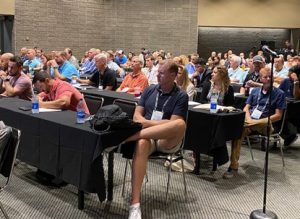 CLA Director of Membership and Education Danielle Bauer welcomed nearly 600 attendees to the organization’s first educational seminar of Clean 2022 at the Georgia World Congress Center in Atlanta.
CLA Director of Membership and Education Danielle Bauer welcomed nearly 600 attendees to the organization’s first educational seminar of Clean 2022 at the Georgia World Congress Center in Atlanta.
With laundromats designated as an “essential business,” the industry has experienced rapid growth in attracting new people. Many of these new owners are from other industries and bring new expertise in technology, marketing and business acumen.
This opening day panel discussion – dubbed “The Next Generation of Laundromats” – featured four leading operators from the “new generation” of industry leaders.
The program’s moderator was Alex Smereczniak of Laundrolab, who took his three panelists through a series of provocative questions regarding the future of laundromats. Those panelists included Felicia Galitsky, Chief of Staff, Laundry Capital; Bhavin Patel, CEO, SpinXpress; and Mark Vlaskamp, The Folde.
Smereczniak kicked off the conversation by asking his panelists what they felt were some of the leading opportunities for tomorrow’s laundromats. Not surprisingly, the responses were heavily technology-related.
Galitsky sees three keys to the future of laundromats lying in more robust business technology, the enhanced ability to receive customer feedback, and fully understanding store demographics.
“Technology will only expand, and it’s going to be accelerated,” Patel said. “The old way of doing laundry has become outdated. The energy has changed. The laundry industry used to be very passive, but it’s becoming more active, sophisticated, innovative and retail-focused.”
“It’s exciting to see how sexy laundromats are becoming,” Vlaskamp added.
Many laundromats also are becoming more full-service, which led Smereczniak to ask his panelists about the future of wash-dry-fold and pickup and delivery.
“It has attracted a lot of new investors, and some will need it to stay competitive in their markets,” Galitsky explained. “In the next 10 years, residential laundry pickup and delivery will be widely accepted, just like food delivery today.”
However, “it will never replace everyone’s washer and dryer,” noted Vlaskamp, whose Texas-based company is heavily involved in the PUD business.
As relative newcomers to the laundromat business, each “next generation” owner was asked about misconceptions of running a laundry operation.
The consensus was that perhaps the biggest myth was that laundromats provide a simple, passive income.
“It’s not rocket science, but you have to work,” Vlaskamp said.
“You need to be an active participant,” Patel concurred. “If not, you can lose a lot of money believing the myth of it being an ‘easy business.’”
The panelists also were in agreement on the benefit of implementing corporate social responsibility programs within their businesses.
“Building partnerships can go a long way,” Galitsky said. “Developing goodwill within your community is a win-win-win.”
“As laundromat owners, we have the opportunity to be the center of our communities,” explained Patel, who pointed to something as simple as Wi-Fi access as a way to make a difference to store customers. “Leverage that for your laundry business. It’s important and powerful.”
On the topic of supporting the communities being served, Smereczniak was quick to mention the impact that a LaundryCares’ Read, Play and Learn Center can have on a laundromat’s perception within its community.
“It’s low-investment and high-impact,” he noted.
Although the hour-long session focused strongly on understanding and embracing today’s emerging technologies to better operate and manage a professional laundry business in 2022 and beyond, Vlaskamp offered attendees some old-school take-away advice as well.
“Slow down, and don’t over complicate it,” he said. “Understand that it’s not a commodity. Do it, do it well – and charge appropriately for it.”











